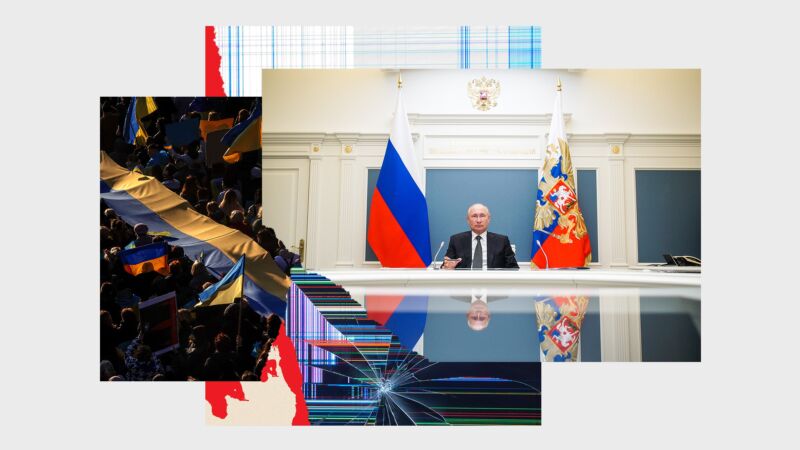

Russia’s disinformation machinery breaks down in wake of Ukraine invasion
source link: https://arstechnica.com/tech-policy/2022/03/russias-disinformation-machinery-breaks-down-in-wake-of-ukraine-invasion/
Go to the source link to view the article. You can view the picture content, updated content and better typesetting reading experience. If the link is broken, please click the button below to view the snapshot at that time.

Open your eyes / see the lies right in front of you —
Russia’s disinformation machinery breaks down in wake of Ukraine invasion
A few critical errors have cost Russia dearly when it comes to disinformation.
Tom Southern, wired.com - 3/12/2022, 11:50 AM

For decades now, Vladimir Putin has slowly, carefully, and stealthily curated online and offline networks of influence. These efforts have borne lucrative fruit, helping Russia become far more influential than a country so corrupt and institutionally fragile had any right to be. The Kremlin and its proxies had economic holdings across Europe and Africa that would shame some of the smaller 18th-century empires. It had a vast network of useful idiots that it helped get elected and could count on for support, and it controlled much of the day-to-day narrative in multiple countries through online disinformation. And many people had no idea.
While a few big events like the US’s 2016 election and the UK’s Brexit helped bring this meddling to light, many remained unaware or unwilling to accept that Putin’s disinformation machine was influencing them on a wide range of issues. Small groups of determined activists tried to convince the world that the Kremlin had infiltrated and manipulated the economies, politics, and psychology of much of the globe; these warnings were mostly met with silence or even ridicule.

All that changed the moment Russian boots touched Ukrainian soil. Almost overnight, the Western world became overwhelmingly aware of the Kremlin’s activities in these fields, shattering the illusions that allowed Putin’s alternative, Kremlin-controlled information ecosystem to exist outside its borders. As a result, the sophisticated disinformation machinery Putin spent decades cultivating collapsed within days.
Advertisement
Russia’s network of influence was as complex as it was sprawling. The Kremlin has spent millions in terms of dollars and hours in Europe alone, nurturing and fostering the populist right (Italy, Hungary, Slovenia), the far right (Austria, France, Slovakia), and even the far left (Cyprus, Greece, Germany). For years, elected politicians in these and other countries have been standing up for Russia’s interests and defending Russia’s transgressions, often peddling Putin’s narratives in the process. Meanwhile, on televisions, computers, and mobile screens across the globe, Kremlin-run media such as RT, Sputnik and a host of aligned blogs and “news” websites helped spread an alternative view of the real world. Though often marginal in terms of reach in and of themselves (with some notable exceptions, such as Sputnik Mundo), they performed a key role in spreading disinformation to audiences in and outside of Russia.
But the digital realm is where Russia found the most success in opening new fronts in its disinformation war. Social media, quasi-legitimate blogs, and bots reached ordinary people en masse all the time. With skill and care, Russian operatives tested and retested how best to polarize audiences. Using different platforms, content, and messaging, they built up a profile of users for their targeting purposes and then reflected back to them a picture of the world that would make them angry, frightened, and despairing—a picture that only exists online. For evidence of this, look no further than recent discourse in the West, where the Kremlin has been amplifying everything from climate denialism to the anti-vaxx movement to QAnon. All these things already existed but were the preserve of conspiracy theorists, quacks, and pranksters—now millions believe, in the face of reality, that climate change was made up by Green extremists, that “they” (whether it be Bill Gates, George Soros, or the World Economic Forum) are using vaccines to microchip people, that there's a satanic cabal of baby-eaters in Washington, or all of the above.
Page:
Recommend
-
 20
20
Nvidia cyberattack not related to Russia’s invasion of Ukraine, report says
-
 9
9
Russia blocks Twitter as Ukraine invasion escalates Disturbing images from the invasion have circulated widely on the platform By...
-
 8
8
Apple Ends All Product Sales In Russia Over Ukraine Invasion
-
 8
8
News Analysis Rash of hacktivism incidents accompany Russia’s invasion of Ukraine Some in the cybersec...
-
 12
12
MediaRussia-backed cable news station RT America shuts down operations immediately amid Ukraine invasionPublished Thu, Mar 3 20224:08 PM ESTUpdated Thu,...
-
 8
8
Silicon Valley is boycotting Russia over Ukraine invasionKey PointsCEO Tim Cook speaks at an Apple event at the company’s headquarters in Cupertino, California, September 10, 2019.S...
-
 7
7
EconomyMicrosoft suspends sales in Russia in major blow to Russian economySoftware giant is the latest company to abandon the country after...
-
 9
9
Russia’s Invasion of Ukraine & De-Communization EffortsWith an ever-expanding NATO and a Russia poised to solidify its position in a world increasingly defined by multipolarity, the working class has suffered at...
-
 13
13
March 3, 202212:25 AM UTCLast Updated 6 days agoU.N. General Assembly in historic vote denounces Russia over Ukraine invasion4 minute read0 seconds of 0 secondsVolu...
-
 14
14
TechnologyChina is Russia’s most powerful weapon for information warfare Tech giants and governments have crippled Russian state...
About Joyk
Aggregate valuable and interesting links.
Joyk means Joy of geeK